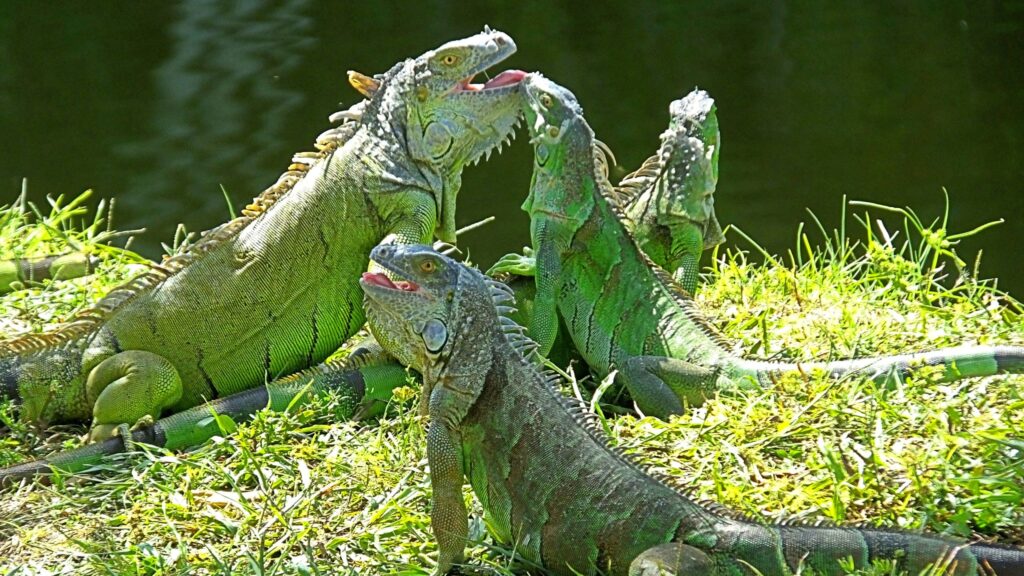Introduction
If you live in an area where iguanas are prevalent, such as us over here in sunny South FL you may find yourself looking for effective ways on how to get rid of iguanas. These reptiles, while fascinating, can cause significant damage to property and local ecosystems. We hope to inform the public of the best ways to manage iguana populations, focusing on humane and natural methods.
Understanding Iguana Behavior
Before delving into how to get rid of iguanas, it’s important to understand their behavior. Iguanas are primarily herbivores and are attracted to areas with abundant vegetation. They are excellent climbers and can often be found basking in sunny spots or foraging for food.
- Habitat: Iguanas thrive in warm climates and are commonly found in South Florida. They prefer areas with dense foliage and access to water.
- Diet: Their diet mainly consists of leaves, flowers, and fruits, but they can also consume small animals and insects.
Preventative Measures
Prevention is the first step in managing iguana populations. Here are some iguana removal tips to make your property less attractive to these reptiles:
- Secure Food Sources: Remove fallen fruits, vegetables, and other potential food sources from your yard.
- Eliminate Hiding Spots: Clear away dense vegetation and debris where iguanas may hide.
- Protect Plants: Use wire mesh or protective coverings to safeguard your plants from iguanas.
Natural and Humane Removal Techniques
When it comes to how to get rid of iguanas naturally, there are several methods you can employ that are both effective and humane. However, we have not seen any of these methods fully resolve iguana issues without using professionals.
1. Water Sprays
Iguanas dislike being sprayed with water. Using a garden hose to spray them can encourage them to move away from your property without causing harm.
- Effectiveness: This method is particularly useful for deterring iguanas from specific areas like patios or gardens.
2. Iguana Repellents
There are commercial iguana repellents available that use natural ingredients to deter iguanas. These products are safe for use around pets and humans.
- Application: Apply the repellent around the perimeter of your property or in areas where iguanas are commonly seen.
3. Habitat Modification
Altering the environment to make it less hospitable for iguanas is another effective strategy. This includes reducing the amount of vegetation and providing fewer sunny basking spots.
Professional Iguana Control
For severe infestations, professional help may be necessary. Companies like us at, Iguana Busters specialize in humane iguana removal and can provide tailored solutions to manage and reduce iguana populations on your property.
- Assessment: Professionals can assess the extent of the infestation and recommend appropriate control measures.
- Implementation: They use safe and humane techniques to capture and relocate iguanas, ensuring minimal stress to the animals.
Contact us today for professional iguana removal methods.
Frequently Asked Questions
In Florida, it is legal to humanely capture and remove iguanas. However, it’s important to follow state guidelines to ensure humane treatment.
If you discover an iguana nest, it’s best to contact a professional iguana removal service such as Iguana Busters to handle the situation safely and effectively.
Implementing preventative measures, such as removing food sources and securing hiding spots, can help deter iguanas from returning. However, we suggest contacting us to ensure your iguana problem is solved ASAP.
Conclusion
Dealing with iguanas can be challenging, but with the right knowledge and techniques, you can effectively manage their presence on your property. From understanding their behavior to employing natural and humane removal methods, we hope one of these suggestions provides a valuable solution on how to get rid of iguanas.
For expert iguana removal services and further assistance, contact Iguana Busters. Our team is committed to providing safe and effective solutions to keep your property free from iguanas.


